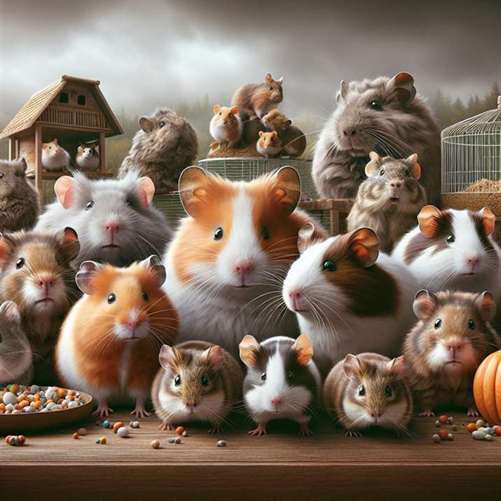Pet Rodents for Families: Top Picks
Introduction
Did you know that pet rodents, like hamsters, guinea pigs, and gerbils, are among the most popular pets for families? Studies show that these lovable creatures can significantly help children learn about responsibility and empathy. With their charming personalities and ease of care, pet rodents for families have become a staple in many households.
In recent years, there has been a notable trend in pet ownership, with families increasingly seeking out small mammals as ideal companions for their children. These furry friends not only provide endless entertainment but also require relatively low maintenance and cost, making them perfect for families with busy lifestyles.
From interactive playtime to simple care routines, pet rodents offer a wealth of benefits for families. They can foster a sense of companionship and teach kids valuable lessons about nurturing another creature. If you’re considering adding a new member to your family, it’s essential to discover the best small pets for kids.
In this article, we will explore the diverse world of pet rodents for families, highlighting their characteristics, care needs, and the best options available for family-friendly pets.
What is Pet Rodents for Families?
Definition
When we talk about pet rodents for families, we refer to small mammal companions that are often kept in households. These include hamsters, guinea pigs, gerbils, and mice, which are known for their playful behavior and social nature. They make excellent pets due to their manageable size and generally friendly demeanor, making them suitable for children and families.
Historical Context
The journey of pet rodents from the wild to our homes is fascinating. Hamsters, for instance, were first discovered in Syria in the 1830s and were domesticated in the 1940s. Since then, they have rapidly gained popularity as household pets. Guinea pigs, originally bred for food in South America, became beloved pets in Europe by the 16th century. The rise of these small mammals as companions reflects changing attitudes towards pet ownership, emphasizing the emotional bonds we form with animals.
The Importance of Pet Rodents for Families
Pet rodents play a crucial role in family settings. They provide companionship, stimulate play, and can even help teach children responsibility. By caring for a small pet, children learn valuable life skills, such as empathy and nurturing. Moreover, these pets can be a great source of joy, offering comfort and reducing stress.
Pet Rodents for Families in the Context of the Pet Industry
The pet industry has seen a significant increase in the popularity of pet rodents. As families look for pets that require less space and commitment than traditional pets like dogs or cats, small mammals have emerged as a preferred choice. Their affordability and ease of care make them particularly appealing to first-time pet owners.
Key Players or Contributors
Numerous organizations and breeders have contributed to the growing interest in pet rodents for families. For instance, educational programs and community outreach initiatives aim to raise awareness about the benefits of small mammals as pets. Explore more about caring for small pets to understand what it takes to provide a loving home for these creatures.

How Does Pet Rodents for Families Work?
The Mechanics of Pet Rodents for Families
Integrating pet rodents for families into daily life involves understanding their needs and behaviors. Here are the essential aspects of caring for these small pets:
Selecting the Right Pet Rodent
Choosing the right type of pet rodent is crucial. Each species has unique traits and care requirements. For example:
- Hamsters are nocturnal and can be more independent.
- Guinea pigs thrive in pairs and are social creatures that enjoy interaction.
- Gerbils are energetic and love to dig, requiring ample space to explore.
Understanding these differences is vital for a harmonious family experience.
Creating a Suitable Habitat
Providing a safe and comfortable habitat is essential for any pet rodent for families. Here are some tips:
- Cage Size: Ensure the cage is spacious enough for your pet to move around freely.
- Bedding: Use safe bedding materials that are dust-free and absorbent.
- Enrichment: Include toys, tunnels, and chew items to keep your pet engaged.
Feeding and Nutrition
Proper nutrition is fundamental to your pet’s health. Each type of rodent has specific dietary needs:
- Hamsters: Require a mix of pellets, fresh vegetables, and occasional treats.
- Guinea pigs: Need hay, pellets, and fresh vegetables high in vitamin C.
- Gerbils: Thrive on a diet of pellets and seeds, with occasional fruits and vegetables.
Caring for Pet Rodents: Daily Routines
Caring for pet rodents for families involves establishing daily routines that ensure their well-being. Here are some key tasks:
- Feeding: Ensure pets receive fresh food and water daily.
- Cleaning: Regularly clean the cage and change bedding to maintain hygiene.
- Interaction: Spend time interacting with your pet to build trust and companionship.
Understanding Behavior
Understanding the behavior of your pet rodents for families can enhance your relationship. For instance:
- Hamsters may exhibit burrowing behaviors, which is natural and should be encouraged.
- Guinea pigs communicate through squeaks and purrs, indicating their mood.
- Gerbils are social and enjoy playing, making them great companions for kids.
Training and Socialization
Contrary to popular belief, many pet rodents can be trained. Here are some simple methods:
- Hamsters: Can be trained to respond to their name or do simple tricks.
- Guinea pigs: Can learn to come when called, especially if rewarded with treats.
- Gerbils: Can be socialized to enjoy being handled and played with.
Benefits of Pet Rodents for Families
Emotional and Social Benefits
Having pet rodents for families can provide numerous emotional and social benefits. Here are some of the highlights:
- Companionship: They offer unconditional love and companionship, making them great for families.
- Stress Relief: Interaction with pets can significantly reduce stress levels for both children and adults.
- Teaching Responsibility: Caring for a pet teaches children about responsibility and the needs of others.
Educational Benefits
Pet rodents can also be educational tools for children. They can learn about:
- Biology: Understanding the life cycle and needs of these animals.
- Empathy: Learning how to care for another living being.
- Responsibility: Managing feeding and cleaning routines instills a sense of accountability.
Financial Considerations
One of the most appealing aspects of pet rodents for families is their affordability. They generally require lower initial and ongoing costs compared to larger pets. Here’s a breakdown:
- Initial Setup: Cages, bedding, and food can be purchased at a reasonable price.
- Ongoing Costs: Regular food and bedding replacements are less expensive than veterinary care for larger pets.
Popular Pet Rodents for Families
Hamsters
Hamsters are often the first choice for families looking for a small pet. They are relatively low-maintenance and can be very entertaining.
- Care Needs: A spacious cage, a wheel for exercise, and a balanced diet.
- Best for: Families with older children who can handle them gently.
Guinea Pigs
Guinea pigs are known for their gentle demeanor and sociability. They thrive in pairs and are great for interactive play.
- Care Needs: A large cage, plenty of hay, and daily social interaction.
- Best for: Families looking for a pet that enjoys companionship.
Gerbils
Gerbils are active and curious creatures. They are fun to watch as they dig and explore their environment.
- Care Needs: A well-ventilated cage, sand for digging, and a varied diet.
- Best for: Families seeking a lively and engaging pet.
Mice
Mice are small, easy to care for, and can be very social. They are great for families with limited space.
- Care Needs: A secure cage, social interaction, and a balanced diet.
- Best for: Families looking for a pet that requires minimal space.
Future Trends in Pet Rodents for Families
As the world of pet ownership continues to evolve, several trends are emerging in the realm of pet rodents for families.
Increased Adoption Rates
More families are choosing to adopt rather than shop for pets. This trend is likely to continue as awareness of pet adoption benefits grows. Organizations are fostering a culture of responsible pet ownership by highlighting the importance of adopting small mammals.
Focus on Health and Wellness
Pet owners are becoming more conscious of their pets’ health. There is a growing demand for high-quality, nutritious food and safe, engaging toys. Families are seeking to provide the best for their furry companions, ensuring they lead happy, healthy lives.
Emphasis on Education
As families look for ways to educate their children, the role of pet rodents for families as teaching tools will grow. Educational programs around pet care and responsibility will likely expand, helping children understand the importance of compassion and care.
Conclusion
Pet rodents like hamsters, guinea pigs, and gerbils are not just adorable companions; they are also excellent pets for families.
Resource Links:
- reddit.com: … If they’re in a big enough cage, parents are clued up and willing to look after them rats are probably the best small pet around children …
- babycenter.com: … The best pets for small kids · Dogs and cats · Fish · Rats · Guinea pigs. Guinea pigs make the ‘best’ list since they’re friendlier than rabbits …
- reddit.com: … In my opinion, the California Kingsnake is the best pet snake for children. Super easy to care for very docile snake that is just the right …




0 Comments